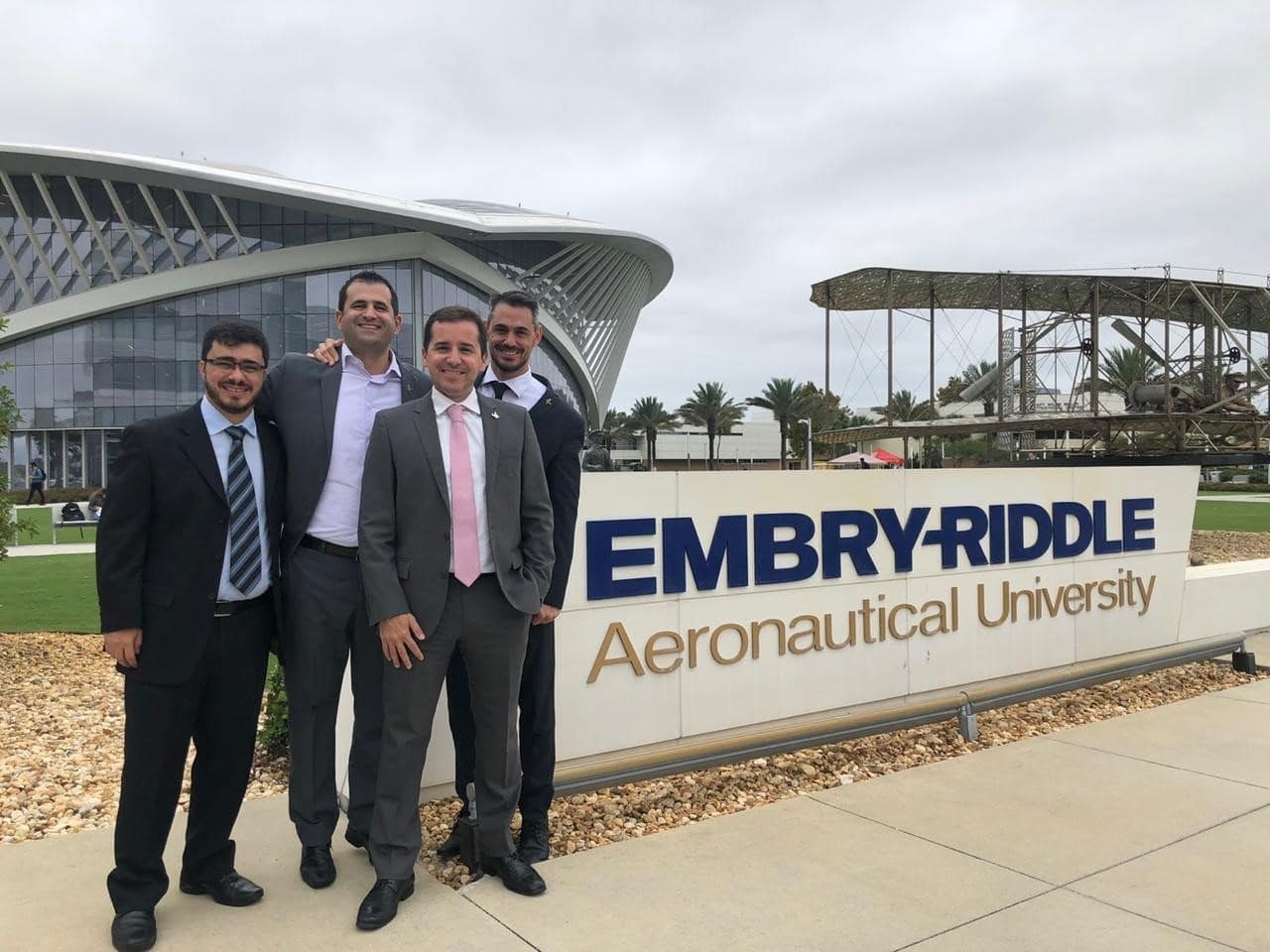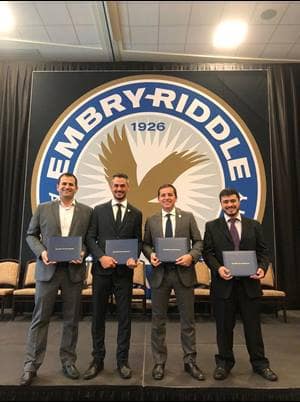Capstone project helps change Brazil aviation rule to save airlines millions

A senior capstone project by four Embry-Riddle Aviation Management students has led Brazil’s aviation regulator to change a longstanding fuel requirement, a move that could save airlines in that country millions of dollars a year.
“It’s not every day you can get a regulator to change something like that,” said Diogo Youssef, who teamed with Fabiano Gomes, Joao Centeno and Luciano Oliveira to create the groundbreaking project. “We’re very proud of what we’ve done.”
“We saw this as an opportunity to make a difference,” said Oliveira.
Dr. Leila Halawi, Associate Professor & Program Chair for Master of Aviation & Aerospace Sustainability, worked with the students as part of the Aviation Management Program – Class of 2019, which is offered in partnership with CNT, SEST SENAT, ITL, and ABEAR.
Dr. Halawi said the four were determined to deliver a significant contribution and succeed.

From left to right, Diogo Youssef, João Centeno, Luciano Figueiredo Vale de Oliveira, and Fabiano Gomes de Oliveira receive their Aviation Management diplomas from Embry-Riddle’s South America Campus.
“Their enthusiasm, passion, and dedication to their studies and motivation to collaborate, even though they mostly work for competing airlines in the country, are remarkable and commendable,” she said. “It is such a humbling experience and the utmost pleasure to be part of their journey.”
The students focused on the fuel that’s required to be aboard each airliner for every trip. Regulations mandate a certain amount of fuel be carried as a contingency, in case weather or other issues force pilots to deviate from original routes, which increases the total fuel burned to arrive at its destination.
The ICAO standard calls for flights to have 5% of contingency fuel. But Brazil never adopted that standard, mandating instead that flights operated by Brazilian carriers to have 10% of that contingency fuel aboard.
“That put Brazil’s airlines at a competitive disadvantage,” Youssef said.
Since the students in the group all work in flight operations and understand how much money is spent on fuel, they decided to see if the extra fuel was really needed.
“We wanted to use the academic power of Embry-Riddle to prove it was possible to switch to the 5% requirement,” Youssef said. “Our classes, our professors, and the tools we were able to use made it a great opportunity for us.”
The group gathered data for almost 300,000 flights from Brazil’s top airlines during the past year. In their Business Intelligence class, they learned how to use the historical data to run simulations to look at how much fuel was used and how much was left if the contingency fuel requirement was changed from 10% to 5% .
“It wasn’t easy,” Youssef said. “It was a lot of work, because sometimes just running the simulations took four to six hours – and it took four days just to do the simulations.”
Once the simulations were run, they returned almost 1 million simulated flights, and the group had to analyze reams of data for flights grouped by duration to see how much fuel was used and how much remained once the trips were completed.
The four students found that by using the 5% mandate, there wasn’t a single instance where a Brazilian plane would have landed with less fuel than the law required.
That revelation, they realized, had the potential to save Brazilian carriers about $6.5 million in fuel expenses each year.
The four students presented their findings together with ABEAR to the National Civil Aviation Agency (ANAC) in December. By January, the agency announced the change in Brazil’s regulation to allow 5% as the minimum baseline for safe operations, which became effective on April 1.
Oliveira said the quality of the simulations and the data also helped address concerns raised by the country’s pilots union about scaling back the requirement.
“Our numbers were strong and proved that it was safe,” he said.
The fact that the project carried the Embry-Riddle name didn’t hurt, either.
“There is a lot of weight with that,” Oliveira said, adding that the support of their professors also helped them through the many difficult spots they hit during the project.
“It was very demanding,” Oliveira said of the undertaking. “If we hadn’t been Eagles, we could not have done it.”
The Aviation Management Program is offered in Brazil by Embry-Riddle in a partnership with CNT, SEST SENAT, ITL and ABEAR. If you’d like to find out more about it, visit www.itl.org.br/certificacao-internacional-aviation.
Organizations or companies that want to learn more about Embry-Riddle’s powerful Professional Education and research capabilities can contact Israel Treptow at treptowi@erau.edu or +55 (11) 4410-3728.

 Jon O'Neill
Jon O'Neill